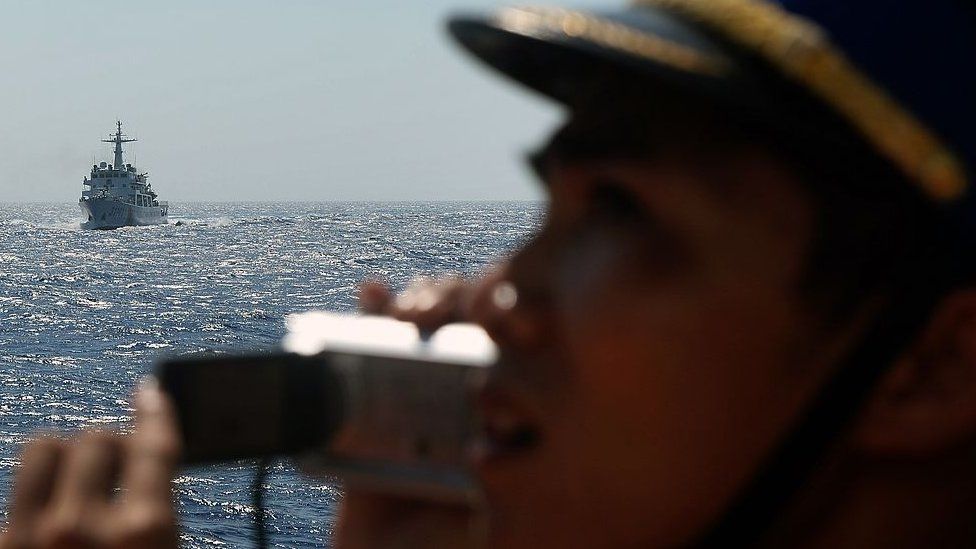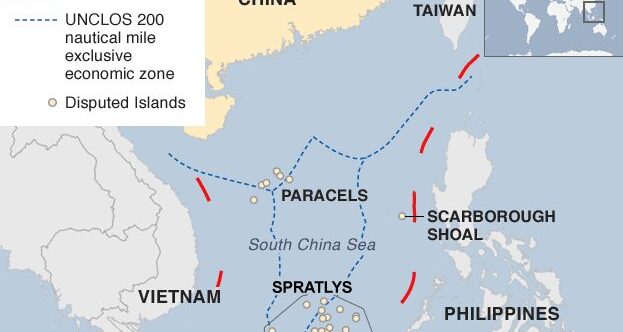By Phaidra Chrysostali,
The Sino-Philippines relations experienced some difficulties that may damage their relations forever. The territorial dispute about the Spratly Islands that affected five Asian countries erupted with the construction of artificial islands by China. Even though those islands were within the Philippine’s exclusive economic zone, China claimed sovereignty over the islands based on historical precedents and proceeded with the construction of artificial islands in order to exploit the abundance of natural resources that they offered. China’s actions generated an international security threat and caused a lot of upheavals in the international community, since they violated the international law of the sea. In 2013, the Philippines alerted the international community that it had initiated a case against China regarding its continuous illegal acts. The case was handled by the United Nations Convention on the Law of the Sea, which would resolve the territorial dispute and offer a solution since the two countries could not cooperate at a bilateral level.
The longstanding unresolved territorial dispute between the People’s Republic of China (PRC) and the Philippines in the South China Sea has proved that the International Court of Justice (ICJ) does not have the power to force its resolutions if the states involved do not agree with them. The territorial dispute between China and the Philippines is concerned about the ownership of about fifty small islands and reefs in the Spratly group which is located in the South China Sea. The Spratly group is comprised of 230 rock formations, the sovereignty of which is debated among six countries – China, Taiwan, Vietnam, Malaysia, the Philippines, and Brunei. China, Taiwan, and Vietnam argue that they own the entire chain of islands, Malaysia and Philippines claim certain parts while Brunei claims only a small part of those territorial waters.

Philippines claims that the fifty islands that are located 230 nautical miles west of Palawan Island, which is also called Kalayaans, belong to them. It is important to mention that the sovereignty of those islands is of outmost importance for Philippines since they provide maritime resources such as fish and oil and gas, which can crucially improve Philippine’s economy. During the second half of the 20th century, Russian seismologists discovered vast oil reserves on those islands which instantly made them valuable for the Asian countries surrounding them. In 1974, the Filipino national Thomas Cloma transferred sovereignty of the islands to the Philippines since he had previously declared them res nullius. The dispute escalated when, in 1978, the president of Philippines extended its Exclusive Economic Zone (EEZ) and it evolved in rival acts of sovereignty between the two countries such as stationing troops, building lighthouses and weather stations. Lastly, in 1982 the two countries signed the UN convention on the law of the sea, which created more conflicts since the two countries disagreed over maritime entitlements and access to maritime resources.
The Philippines government decided to file an arbitration case in 2013 in response to constant Chinese militarization of the Spratly islands in South China sea. The body set to hear the case against China is the United Nations Convention on the Law of the Sea (UNCLOS). UNCLOS is a treaty which was created to ensure a balance between freedom of navigation and utilization of the oceans and at the same time to ensure sovereign rights and control over the sea and its resources. Its role is to solve longstanding disputes and to establish the limits of maritime zones and who can do what in each zone and also in the airspace above them. In the arbitration case, the Philippines’ government states its complaints about how China has violated the internationally-sanctioned rules of the 200 nautical mile EEZ that every country is entitled to and moreover claimed sovereignty over waters and reefs that are located 870 nautical miles from the People’s Republic of China land. Furthermore, they accused China of violating international law and for bullying Philippines to withdraw from some of the areas of dispute. China still refused to attend this case, since it supported that they have sovereign rights over those territories and that UNCLOS is not in position to determine whether or not China has rights over those islands.

Many would think that an International Court of Justice (ICJ) verdict would be binding and compulsory, but in the case of the Philippines-China dispute it did not happen. UNCLOS has a very complex system when it comes to interpretation or application of its provisions. Before applying their case to UNCLOS, states need to try to settle their disputes through peaceful means and negotiations that would help them build a cooperative relation without the need of a court decision. But if countries wish to come to a binding decision, article 282 states that the states involved in the dispute should apply their case under UNCLOS after having agreed first through a general, regional, or bilateral agreement. Both parties must accept the same procedure for settlement, and only submit their case to that procedure unless the parties disagree. But in the case that one of the states of the dispute does not agree on submitting their case under UNCLOS they are not obliged to obey by the jurisdiction.
In the case of the China-Philippines dispute, China had rejected Philippines’ proposal to attend ICJ in order to find a legal and binding solution. Therefore, since UNCLOS does not have an enforcement mechanism which would ensure the application of the jurisdiction by both parties, China does not have to obey any decisions.
References
- Kingdon, E. “A case for arbitration: the philippines’ solution for the south china sea dispute”. Boston College International and Comparative Law Review. 38(1). 129–157.
- Storey, I. J. “Creeping Assertiveness: China, the Philippines and the South China Sea Dispute”. Contemporary Southeast Asia. 21(1). 95–118.
- Woods, S. “The Sino-Philippine South China Sea Dispute”. American Journal of Chinese Studies. 23. 159–171.




